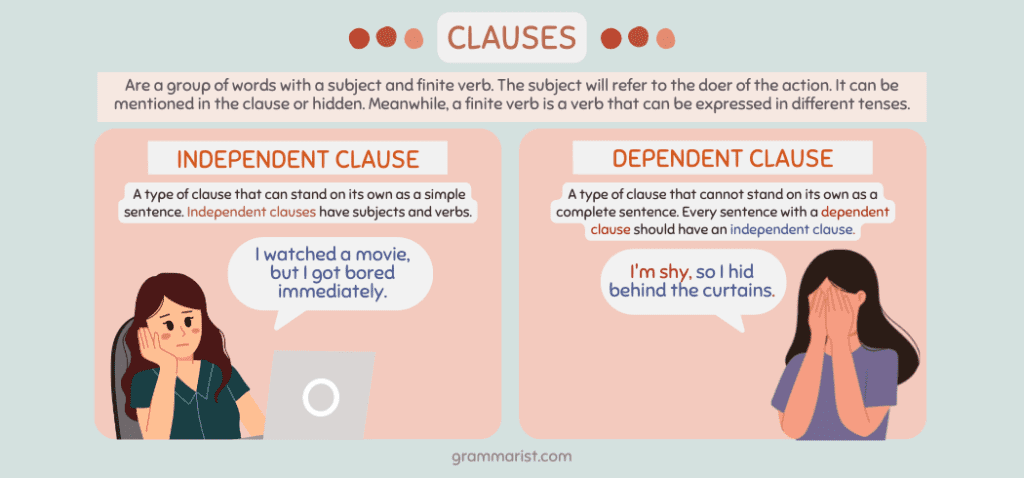You might be here because you’re asking, what is a clause? It’s a good question that seems like it would have a simple answer. But there’s a lot to understand about them. Lucky for you, I’m going to go over everything you need to know!
Clauses are groups of words containing a subject and a verb. It can convey a message about the subject or object, functioning as a noun, adjective, or adverb.
It’s easy to overlook the intricacies of clauses in English. All we know is they are parts of sentences. But my guide will show you everything you need to learn.
Keep reading as we talk about the definition of clauses. I also explain the types of clauses and some examples of how to use them in sentences.
What is a Clause?

Clauses in English Grammar are a group of words with a subject and finite verb. The subject will refer to the doer of the action. It can be mentioned in the clause or hidden. Meanwhile, a finite verb is a verb that can be expressed in different tenses. For example:
- I saw him.
- Because I was there.
- That I told you about.
A clause differs from a sentence fragment since the latter does not have a subject and verb. You also cannot combine sentence fragments to form a specific type of sentence. For example:
- Clause: I graduated last week. (Sentence with one clause).
- Sentence fragment: graduated last week.
Sentences are made of at least one independent clause. A sentence with one main clause is called a simple sentence. A compound-complex sentence will have two or more independent clauses and one or more dependent clauses. For example:
- He gave me food. (simple sentence with one clause)
- He gave me food because I was hungry. (complex sentence with two clauses)
Types of Clauses

The types of clauses are similar to the kinds of sentences.
Declarative Clauses
This type of clause functions as a statement and is either affirmative or negative. It relays information, such as facts or opinions. Its structure is:
- Subject + verb + x
For example:
- My mother bakes cookies. (affirmative)
- I did not see you at the party. (negative)
Interrogative Clauses
An interrogative clause functions as a question. Like declarative clauses, interrogative clauses can also be affirmative or negative. The word order is:
- Wh-word + auxiliary/modal verb + subject + verb + x
For example:
- Do you understand? (affirmative)
- Where are we going? (affirmative)
- Weren’t you in the competition? (negative)
- Why didn’t you tell me? (negative)
Imperative Clauses
An imperative clause is a type of clause that functions as a command, order, or instruction. It can be affirmative or negative too. Its most common order is:
- Verb + x
For example:
- Hurry up! (affirmative)
- Please come to the party. (affirmative)
- Don’t go. (negative)
Use the contraction don’t when using do not in an informal context. You can also use don’t on its own as a reaction to something. For example:
- A: Can I get you coffee?
B: No, don’t. Thank you.
We usually don’t include the subject in imperative clauses because it’s automatically you. But clauses like this one are an exception.
- Don’t you ever come here again.
Some imperative clauses contain the word let and the pronoun us. You can use the contraction let’s for informal situations. For example:
- Let’s get something to eat.
- Let us wait for him.
Exclamative Clauses
Exclamative clauses express sudden or strong feelings. They have three possible word orders:
- What + noun + subject + verb
- How + adjective or adverb + subject + verb
- Auxiliary or modal verb + subject + verb
For example:
- What a cute baby!
- How lovely your voice is!
- Wasn’t he amazing!
Independent Clause
An independent clause is a type of clause that can stand on its own as a simple sentence. It looks like a regular independent sentence. For example:
- She is amazing
- Should you stop?
- Please continue.
- I saw the movie yesterday.
Independent clauses are often joined via conjunctions, commas, or semicolons to form compound sentences—for example:
- She’s a dog, and I’m a chicken.
All of these independent clauses have subjects and verbs. In the third example, which is an imperative clause, the hidden subject is you.
Some independent clauses start with coordinators or coordinating conjunctions. Remember the acronym FANBOYS: for, and, nor, but, or, yet, so. Here are some examples.
- For you are a noble man.
- But she wants a new puppy.
- Or you could join us today.
Here’s an example of a sentence with two independent clauses.
- I went to her performance, but Gemma was not able to come.
- Everybody was cheering for you, but no one was clapping for you.
In the second sentence, the first independent clause is everybody was cheering for you. The second clause is Everybody was clapping for you with the same subject as the first.
Read the sentence below. Can you guess how many independent clauses it has?
- I laugh whenever you make a joke.
It only has one independent clause, and it’s not the whole sentence. The independent clause is I laugh.
Dependent Clauses
A dependent or subordinate clause is a type of clause that cannot stand on its own as a complete sentence. They usually start with a subordinate, such as a relative pronoun, subordinating conjunction, or noun clause marker.
Here’s an example of a dependent clause in a sentence.
- He can’t see clearly without his eyeglasses.
The dependent clause in the sentence is he can’t see clearly. Remember that every sentence with a dependent clause should have an independent clause. Otherwise, it’s not a sentence.
A dependent clause functions as an adjective, noun, or adverb.
Adjective Clause
An adjective or relative clause is a dependent clause that functions as an adjective. That means it modifies a noun or noun phrase. They always start with relative pronouns who, whom, whose, which, and that. For example:
- I saw the guy who went to your house yesterday.
The relative clause who went to your house yesterday modifies the word guy. It starts with the pronoun who because it refers to a person, which is the subject. If the person is the object of the clause or sentence, use the pronoun whom.
Relative clauses can be divided into two: restrictive and non-restrictive clauses. A restrictive clause restricts or defines the meaning of the noun. You cannot remove it from the sentence because the information is vital. For example:
- The members who enrolled in the course are eager to learn.
Who enrolled in the course is essential in the sentence. So you cannot separate it from the sentence by commas. Remember to use that instead of which when referring to non-humans in restrictive clauses. For example:
- The house that we built is undergoing a renovation soon.
A non-restrictive clause uses commas to show that the information is additional but not essential. For example:
- My Science project, which is called Newton’s Cradle, won first prize.
Without the non-restrictive clause, the sentence stays relevant.
- My Science project won first prize.
Noun Clause
Noun clauses are a kind of dependent clause that functions as a noun. They often start with how, that, who, what, why, and other wh- words. Some examples of noun clauses include what I’m seeing and where we’re going. Take a look at these sentences.
- I do not like what I’m seeing.
- The new employee is finally understanding how things work around in the company.
- Do you know where we’re going?
These noun clauses function as direct objects of the transitive verbs.
Adverbial Clause
Some dependent clauses function as adverbs because they modify verbs, adjectives, and other adverbs. They usually start with a subordinate conjunction. Some examples of subordinating conjunctions are because, until, once, due to, and although.
Here are some sentence examples.
- Wipe the board until it’s clean.
Until it’s clean is a subordinate clause. Its got a subject and verb, but it can’t stand on its own as a sentence. It also modifies the verb wipe.
Never Miss a Lesson on Clauses
I hope my tips and examples help you understand the types of clauses in English. Learning the basics of clauses will help you produce variety and accuracy in your writing. I promise!
Clauses can be divided into four: declarative, interrogative, exclamative, and imperative. We can also categorize them as independent or dependent.
An independent clause will stand on its own as a distinct sentence, while a dependent clause can’t. Dependent clauses can be divided into noun, adjective, and adverb clauses.
Comments are closed.